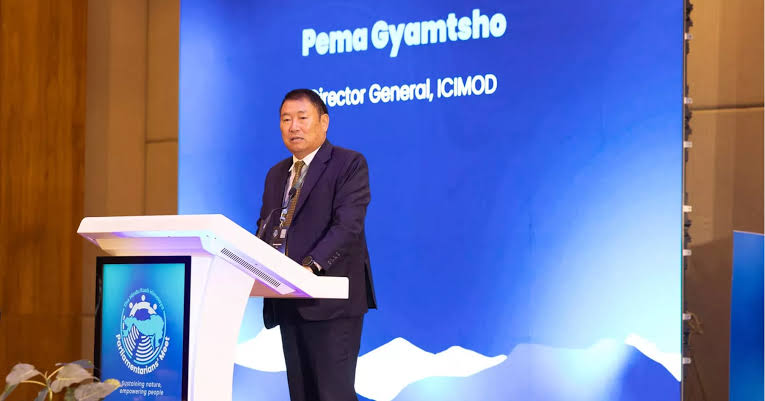Diplomatic Correspondent
Published:2025-08-19 13:53:03 BdST
HKH Meet-2025Over $700b needed by HKH countries annually for adaptation, mitigation: ICIMOD DG
International Centre for Integrated Mountain Development (ICIMOD) Director General Pema Gyamtsho on Monday said the Hindu Kush Himalaya (HKH) countries, including Bangladesh, need around USD 740 billion annually for both adaptation and mitigation.
He said evidence-based policies and legislations, innovative solutions, informed decisions, increased and targeted investment, and collaborative actions are essential for building resilience, prosperity, and sustainability in the Hindu Kush Himalaya region.
"As parliamentarians, your role as people's elected representatives in enacting laws, influencing policies, reviewing development plans and allocating resources, and advocating for mass participation has never been more important and crucial than it is now," said the ICIMOD DG while speaking at the HKH Parliamentarians Meet-2025.
Hindu Kush Himalaya is the “water tower of Asia” and is often referred to as the "Third Pole" because it contains the largest ice mass outside the polar regions and is the source of ten major Asian rivers.
The Hindu Kush Himalayan (HKH) region encompasses eight countries: Afghanistan, Bangladesh, Bhutan, China, India, Myanmar, Nepal, and Pakistan. This region is known for its high mountains, diverse ecosystems, and as the source of ten major river systems.
More than 100 parliamentarians from the Hindu Kush Himalaya have gathered in Kathmandu to discuss shared challenges, explore potential collaborations, and build consensus to implement actionable solutions to the pressing issues of biodiversity loss, climate change, air pollution, and inclusive development.
This is the biggest-ever gathering of regional parliamentarians at the Hindu Kush Himalaya Parliamentarians’ Meet 2025.
President of Nepal Ramchandra Poudel spoke as the chief guest.
Dev Raj Ghimire, speaker, House of Representatives, Nepal, Dr Arzu Rana Deuba, minister of foreign affairs, Nepal, Ain Bahadur Shahi Thakuri, minister of forests and environment, Nepal, Supradip Chakma, adviser to the Government of Bangladesh on Chittagong Hill Tracts Affairs,, Kusum Devi Thapa, chairperson, Agriculture, Cooperatives and Natural Resources Committee, Federal Parliament of Nepal also spoke.
The ICIMOD DG thanked the people and government of Nepal, and in particular, the Parliament of Nepal, for hosting this meeting and for giving ICIMOD the opportunity to support it.
The region supports the livelihoods of 240 million people living in the mountains, and further 1.65 billion people living downstream.
"This means that almost one-fourth of humanity benefits from the HKH.
However, our region faces accelerated impacts from the triple planetary crises - climate change, pollution, and biodiversity loss," said the ICIMOD DG.
Gyamtsho said glaciers are melting faster than ever before and together with other climatic events, they are facing a situation of either too much or too little water.
"Floods and droughts are often occurring at the same time in different parts of our region," he said.
Gyamtsho said some 70–80 percent of the original habitat of the HKH has already been lost, affecting livelihoods, ecosystem function and services, and driving human-wildlife conflict.
"Our region, particularly the Indo-Gangetic Plains and Himalayan Foothills id one of the most polluted regions in the world, with PM2.5 levels often exceeding 400 Mg per Cu.M," he said.
"This has serious impacts on our health, quality of life, environment, agricultural productivity, and the economy," said the DG, adding that HKH is becoming an epicentre of multi-hazards with increasing vulnerabilities from geological, hydrological and climatic risks.
He said most of the challenges they face, disasters, air pollution, biodiversity loss, are transboundary in nature.
"And despite their global importance, mountain ecosystems remain underrepresented in national, regional, and international climate policies," Gyamtsho said.
Existing frameworks often overlook the unique challenges and contributions of mountain regions, leaving them inadequately addressed in global environmental governance.
Increasing losses and damage from climate-change-induced hazards and disasters have significantly increased the investment needs, he said.
Gyamtsho said this historic parliamentarians’ meet has brought all in the same room to discuss the shared challenges and most importantly to come up with shared solutions for the member countries of the Hindu Kush Himalaya.
"Even more importantly, you can contribute to building trust and confidence among our peoples and governments and strengthen collaboration and cooperation to move towards a more harmonious, prosperous, and safer region," said the ICIMOD DG.
"We may argue that this is a tall ask given the geo-political challenges we are facing. But what is the alternative to cooperation? The cost of non-cooperation is too great even to fathom," he mentioned.
ICIMOD, as a regional knowledge organisation, will continue to support its member countries by facilitating the sharing of knowledge, information and innovation in addressing the shared challenges of the region, said the DG.
"We will also continue to advocate for mountain issues at the national, regional, and international levels," Gyamtsho mentioned.
He urged all to take this opportunity to strengthen collaboration among the countries of the Hindu Kush Himalaya to align the regional efforts with global climate goals.
"Together we can build resilient ecosystems that support the well-being of our communities. We have the science, we have the data, we know enough to act now. What we need is an effective regional mechanism for taking collective actions," Gyamtsho said.
"It’s time for action - in our own countries as well as jointly as a region before it’s too late. This meet is a small step but as they say “the journey of a thousand miles start with a small step” it is a very significant first step," he added.
Unauthorized use or reproduction of The Finance Today content for commercial purposes is strictly prohibited.


